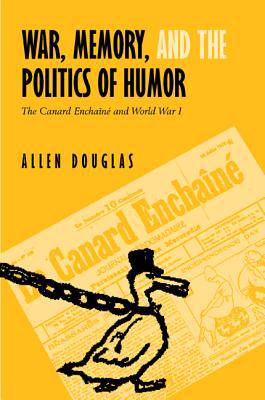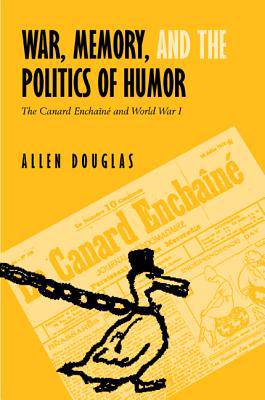
Je cadeautjes zeker op tijd in huis hebben voor de feestdagen? Kom langs in onze winkels en vind het perfecte geschenk!
- Afhalen na 1 uur in een winkel met voorraad
- Gratis thuislevering in België vanaf € 30
- Ruim aanbod met 7 miljoen producten
Je cadeautjes zeker op tijd in huis hebben voor de feestdagen? Kom langs in onze winkels en vind het perfecte geschenk!
- Afhalen na 1 uur in een winkel met voorraad
- Gratis thuislevering in België vanaf € 30
- Ruim aanbod met 7 miljoen producten
Zoeken
War, Memory, and the Politics of Humor
The Canard Enchaîné and World War I
Allen Douglas
Hardcover | Engels
€ 116,95
+ 233 punten
Omschrijving
War, Memory, and the Politics of Humor features carnage and cannibalism, gender and cross-dressing, drunks and heroes, militarism and memory, all set against the background of World War I France. Allen Douglas shows how a new satiric weekly, the Canard Enchaîné, exploited these topics and others to become one of France's most influential voices of reaction to the Great War. The Canard, still published today, is France's leading satiric newspaper and the most successful periodical of the twentieth century, and Douglas colorfully illuminates the mechanisms of its unique style.
Following the Canard from its birth in 1915 to the eve of the Great Depression, the narrative reveals a heady mix of word play, word games, and cartoons. Over the years the journal--generally leftist, specifically antimilitarist and anti-imperialist--aimed its shots in all directions, using some stereotypes the twenty-first century might find unacceptable. But Douglas calls its humor an affirmation of life, and as such the most effective antidote to war.
Following the Canard from its birth in 1915 to the eve of the Great Depression, the narrative reveals a heady mix of word play, word games, and cartoons. Over the years the journal--generally leftist, specifically antimilitarist and anti-imperialist--aimed its shots in all directions, using some stereotypes the twenty-first century might find unacceptable. But Douglas calls its humor an affirmation of life, and as such the most effective antidote to war.
Specificaties
Betrokkenen
- Auteur(s):
- Uitgeverij:
Inhoud
- Aantal bladzijden:
- 345
- Taal:
- Engels
Eigenschappen
- Productcode (EAN):
- 9780520228764
- Verschijningsdatum:
- 31/05/2002
- Uitvoering:
- Hardcover
- Formaat:
- Genaaid
- Afmetingen:
- 157 mm x 234 mm
- Gewicht:
- 603 g

Alleen bij Standaard Boekhandel
+ 233 punten op je klantenkaart van Standaard Boekhandel
Beoordelingen
We publiceren alleen reviews die voldoen aan de voorwaarden voor reviews. Bekijk onze voorwaarden voor reviews.









